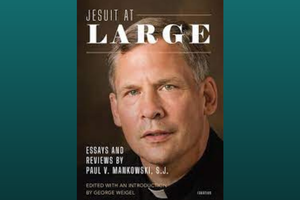The Catholic Life as Co-Redemption
BOOK PICK: God allows us to unite whatever meager sacrifices, prayers, or works we can muster to his perfect sacrifice.

HOW CHRIST SAVES SOULS―WITH US:
The Mystery of Co-Redemption
By Father Michael Giesler
Emmaus Road Publishing, 2022
185 pages, $15.95
Some years ago, as happens every so often, there was a kerfuffle in the secular press over a Catholic theological issue. At the time it was the debate over the Virgin Mary as Co-Redemptrix, she who perfectly cooperated with Jesus Christ in the act of redemption.
Many were riled up over the very thought that one could cooperate with Christ in his work. But an astute and rather well-read altar boy gave his guileless and straightforward opinion on the matter:
“I don’t see what the big deal is. I mean, isn’t that what we’re all supposed to do at Mass?”
In his latest book, How Christ Saves Souls ― With Us: The Mystery of Co-Redemption, Father Michael Giesler zeroes in on this truth of our faith. It’s a bold move, given the Holy Father’s reservations about the term “Co-redemptrix.” But Father Giesler does a good job of respectfully addressing the Pope’s concerns early in the book before forging ahead with his treatment of the topic. Co-redemption doesn’t mean an equal sharing in Christ’s redemptive work — as if he somehow needed our help. Rather, it means that God allows us to unite whatever meager sacrifices, prayers, or works we can muster to his perfect sacrifice.
Father Giesler does more than just defend this theology. He explains how co-redemption is at the heart of it, indeed characterizing the entirety of it. The ability to be a co-redeemer flows first from the economy of salvation.
Beginning with and most conspicuously in the Virgin Mary, God chose to associate men and women in his saving actions. The concept draws also on St. Paul’s words to the Colossians that indicate the amazing possibility of participating in Christ’s saving sacrifice:
“In my flesh I complete what is lacking in Christ's afflictions for the sake of his body, that is, the church” (1:24).
Co-redemption likewise flows from the teaching on the entire Church as the body of Christ, head and members. Incorporated into the body of Christ, we members participate in the saving actions of the head.
Indeed, this is one of God’s most flattering gifts to man. He not only redeems us but makes us participants in our own salvation. Even more, he associates us so intimately with his work that we become co-redeemers.
Or at least are called to become that. Which is the entire point of Father Giesler’s book. For him, co-redemption is not some marginal note in Catholic doctrine. It is at the center of our faith and ought to shape how we live the Christian life. Thus, he considers the different aspects of one’s life and explains how each of us can exercise our status as co-redeemers in whatever situation we find ourselves. The book is an entire catechesis through the lens of co-redemption. There’s no aspect of the Catholic faith that doesn’t touch on this truth.
Ah, but you might quote the old saw, If all you have is a hammer, then everything looks like a nail. But that would be unfair and would fail to appreciate the validity and the depth of the teaching. Thankfully, Father Giesler does a good job of considering the Catholic life and bringing out — not imposing – the implications of this truth. He shows how the doctrine of co-redemption can — and should — characterize our lives.
Back to that altar boy. His observation provides the best way of approaching the topic. As the “source and summit” of our faith, the Eucharist touches on every dimension of Catholicism. What happens at Mass sets the terms for the entire Christian life.
We want the Mass to structure and shape our lives. One prayer from Mass states, “Whenever the memorial of this sacrifice is celebrated, the work of our redemption is accomplished.” Indeed, Christ’s work of redemption is accomplished, made present on the altar, precisely so that we can unite ourselves to it as co-redeemers. Thus incorporated into Christ’s redemptive at Mass, we are to live that status of co-redeemers into every facet of our lives.














